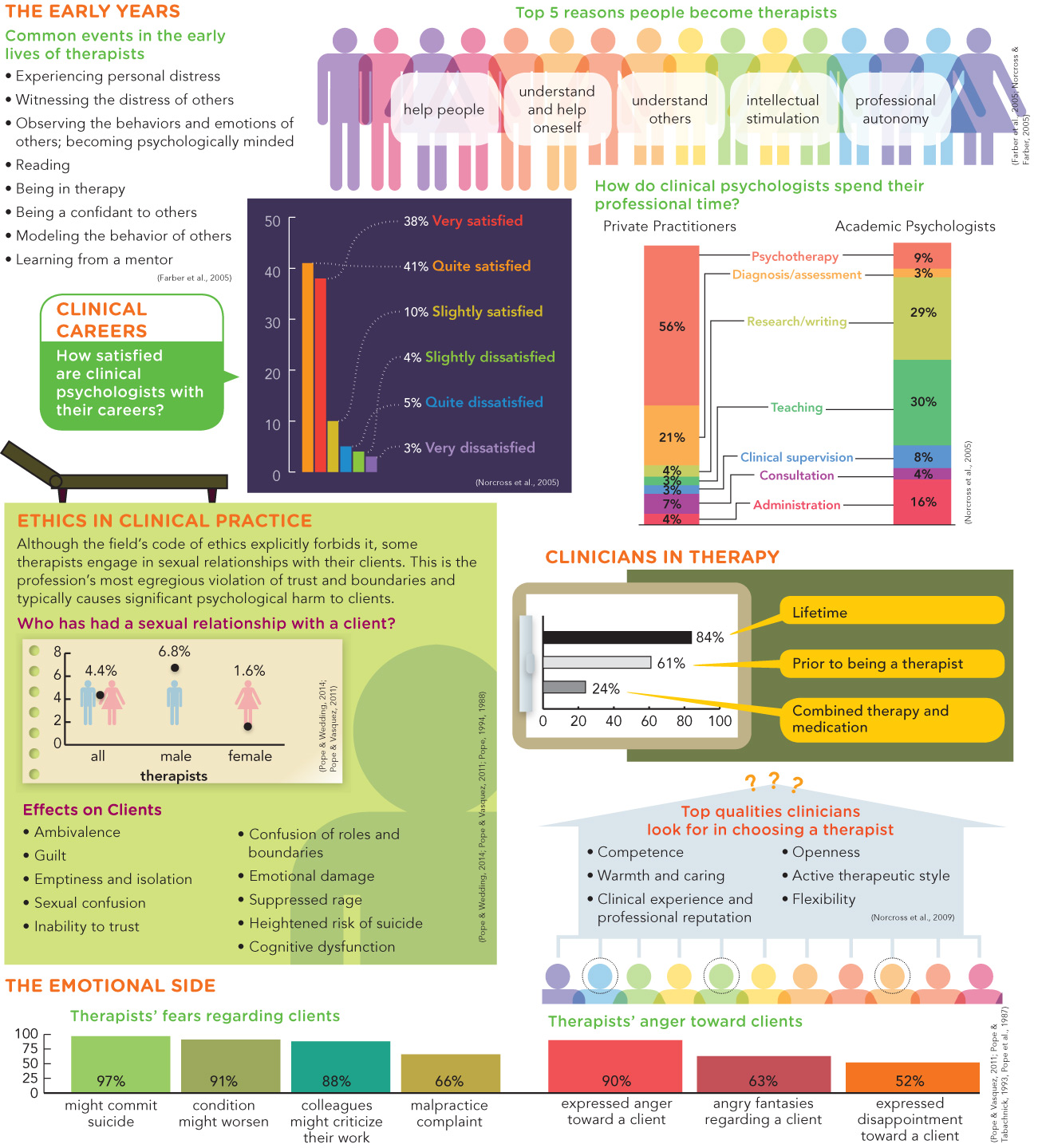16.5 The Person Within the Profession
The actions of clinical researchers and practitioners not only influence and are influenced by other forces in society but also are closely tied to their personal needs and goals (see InfoCentral below). You have seen that the human strengths, imperfections, wisdom, and clumsiness of clinical professionals may affect their theoretical orientations, their interactions with clients, and the kinds of clients with whom they choose to work. You have also seen how personal leanings may sometimes override professional standards and scruples and, in extreme cases, lead clinical scientists to commit research fraud and clinical practitioners to engage in sexual misconduct with clients.
Surveys of the mental health of therapists have found that as many as 84 percent report having been in therapy at least once (Pope & Wedding, 2014; Pope et al., 2006; Pope & Tabachnick, 1994). Their reasons are largely the same as those of other clients, with relationship problems, depression, and anxiety topping the list. It is not clear why so many therapists have psychological problems. Perhaps it is because their jobs are highly stressful; research suggests that therapists often experience some degree of job burnout (Clay, 2011; Rosenberg & Pace, 2006). Or perhaps therapists are simply more aware of their own negative feelings or are more likely to pursue treatment for their problems. Alternatively, people with personal concerns may be more inclined to choose clinical work as a profession. Whatever the reason, clinicians bring to their work a set of psychological issues that may, along with other important factors, affect how they listen and respond to clients.
BETWEEN THE LINES
In Their Words
“I spent . . . two hours chatting with Einstein…. He is cheerful, assured and likable, and understands as much about psychology as I do about physics, so we got on together very well.”
Sigmund Freud, 1927
The science and profession of abnormal psychology seek to understand, predict, and change abnormal functioning. But we must not lose sight of the fact that mental health researchers and clinicians are human beings, living within a society of human beings, working to serve human beings. The mixture of discovery, misdirection, promise, and frustration that you have encountered throughout this book is thus to be expected. When you think about it, could the study and treatment of human behavior really proceed in any other way?

InfoCentral
PERSONAL AND PROFESSIONAL ISSUES
Like everyone else, clinicians have personal needs, perspectives, goals, and problems, each of which may affect their work. Therapists typically try to minimize the impact of such variables on their interactions with clients-

Summing Up
BETWEEN THE LINES
Business and Mental Health
Between 2009 and 2012, U.S. pharma-
(Weber & Ornstein, 2012)
ETHICAL, ECONOMIC, TECHNOLOGICAL, AND PERSONAL FACTORS Each clinical profession has a code of ethics. The psychologists’ code includes prohibitions against engaging in fraudulent research and against taking advantage of clients and students, sexually or otherwise. It also establishes guidelines for respecting patient confidentiality. The case of Tarasoff v. Regents of the University of California helped to determine the circumstances in which therapists have a duty to protect clients or others from harm and must break confidentiality.
Clinical practice and study also intersect with the business and economic worlds. Clinicians often help address psychological problems in the workplace. In addition, private insurance companies often set up managed care programs whose procedures influence—
The remarkable technological advances of recent times have affected the mental health field, just as they have affected all other fields and professions. These advances have, for example, sometimes produced new triggers for psychopathology and have generated various kinds of cybertherapy.
Finally, mental health activities are affected by the personal needs, values, and goals of the human beings who provide the clinical services. These factors inevitably affect the choice, direction, and even quality of their work.